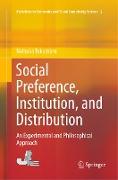Social Preference, Institution, and Distribution
BücherAngebote / Angebote:
This is the first book to examine behavioral theories on social preference from institutional and philosophical perspectives using economic experiments. The experimental method in economics has challenged central behavioral assumptions based on rationality and selfishness, proposing empirical evidence that not only profit seeking but also social preferences matter in individuals’ decision making. By performing distribution experiments in institutional contexts, the author extends assumptions about human behavior to understand actual social economy. The book also aims to enrich behavioral theories of economics directed toward institutional evolution.The author scrutinizes how specific institutional conditions enhance or mute individuals’ selfish incentives or their fairness ideals such as egalitarian, performance-based, labor-value radicalism or libertarianism. From experimental results and their analysis, implications for actual problems in social economy and institutional change are derived: why performance-based pay often fails to promote workers’ productivity, why labor wages decline whereas shareholder’s values increase after financialization, and whether socially responsible investment can be a social institution for corporate governance.The book is also addressed to philosophers of social sciences interested in how experimental methods can contribute to developing cognition of human behaviors and be extended to social theories. Referring to behavioral theorists in the history of economic thought, the author discusses the meanings of experiments in the methodology of social sciences. She also proposes new ways of interpreting experimental results by reviving historic social theories and applying them to actual social problems.
Lieferbar in ca. 20-45 Arbeitstagen
